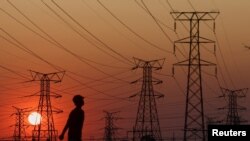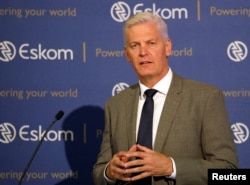The South African government on Wednesday terminated the national state of disaster announced by President Cyril Ramaphosa in early February. The declaration was intended to deal with the worst electricity crisis in the country's history.
The government said the state of disaster had been a "necessary response" to the power crisis, but that since then, a number of measures had been put into place to deal with the constant shortages and daily scheduled blackouts, known as "loadshedding."
Among them was the appointment of a minister of electricity, Kgosientsho Ramokgopa, who has undertaken visits to struggling power stations and met with executives at embattled state power utility Eskom, the minister of cooperative governance and traditional affairs, Thembi Nkadimeng, told a press conference.
"As we move forward, government will, through the Energy Crisis Committee, of course led by the minister, continue to engage, cooperate and coordinate its actions to reduce and eradicate loadshedding using existing legislation and contingency arrangements," Nkadimeng said.
Loadshedding, however, continued Wednesday, even as the state of disaster was revoked, with Stage 4 — or at least five hours a day of power cuts — in place.
The cuts, meant to reduce pressure on the over-stretched electric grid, with its many aging and badly maintained coal-fired power stations regularly breaking down, have hit Africa's most industrialized economy hard.
Eskom CEO Andre de Ruyter left the job earlier this year after giving an explosive interview accusing high-level government officials of corruption. De Ruyter said he was unable to turn the graft-riddled and heavily indebted utility around and alleged there had been a poisoning attempt on his life.
There had been concerns the state of disaster, which did away with some of the bureaucracy surrounding energy procurement, could allow for further corruption. A non-governmental organization and a trade union had filed lawsuits challenging the state of disaster.
Last week, Finance Minister Enoch Godongwana announced Eskom would be exempted from declaring all its expenditures. On Wednesday, after widespread criticism, he backtracked, withdrawing that exemption.
South African opposition parties have staged protests over the electricity situation, as the public becomes more and more frustrated. However, President Cyril Ramaphosa has said there is no quick fix for the crisis.





